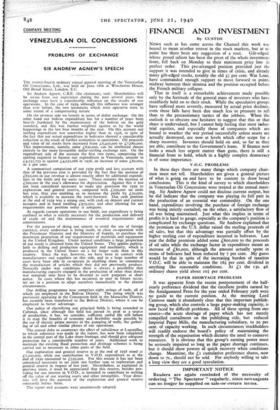FINANCE AND INVESTMENT
By CUSTOS
NEWS such as has come across the Channel this week was bound to mean another retreat in the stock markets, but at no point has there been any suggestion of a rout. Gilt-edged, whose proud salient has been the pivot of the whole investment front, fell back on Monday to their minimum price line in perfect order. This pre-arranged position provided just the support it was intended to give in times of crisis, and already many gilt-edged stocks, notably the old 31 per cent. War Loan, have commanded enough support to move forward to points midway between their minima and the position occupied before the French military collapse.
That in itself is a remarkable achievement made possible only by the fortitude of the general mass of investors who have steadfastly held on to their stock. While the speculative groups have suffered more severely, measured by actual price declines, even these falls have been due much less to pressure to sell than to the precautionary tactics of the jobbers. When the outlook is so obscure one hesitates to suggest that this or that share is undervalued, but I cannot help feeling that most indus- trial equities, and especially those of companies which are bound to weather the war period successfully unless assets are actually destroyed, are now at levels which offer scope for a sharp recovery. Investors should hold on and, so far as they are able, contribute to the Government's loans. If finance now looks a much less urgent matter than guns, there is still a financial front to hold, which in a highly complex democracy is of some importance.
V.O.C. PROBLEMS In these days there are many things which company chair- men must not tell. Shareholders are given a general picture of what is going on and have to be content to draw broad conclusions. This is the kind of survey to whiCh shareholders in Venezuelan Oil Concessions were treated at the annual meet- ing. Sir Andrew Agnew could not disclose current output, but he did indicate that the company was playing its full part in the production . of an essential war commodity. On the one hand, expenditure involving the purchase of foreign exchange was being strictly curtailed; on the other, a satisfactory flow of oil was being maintained. Just what this implies in terms of profits it is hard to gauge, especially as the company's position is complicated by exchange questions. Sir Andrew explained that the premium on the U.S. dollar raised the sterling proceeds of oil sales, but that this advantage was partially offset by the higher sterling cost of expenditure incurred in bolivares. Last year the dollar premium added some L600,000 to the proceeds of oil sales while the exchange factor in expenditure meant an increase of £8o,000, although the amount actually spent in terms of bolivares had been reduced by 7 per cent. My guess would be that in spite of the increasing burden of taxation V.O.C. will be able to maintain the r6i per cent. dividend in anything like reasonable conditions. At Li the 13s. 4d. ordinary shares yield about Doi per cent.
PAPER SHORTAGE PROBLEMS
It was apparent from the recent postponement of the half- yearly preference dividend that the excellent profits earned by the Amalgamated Press for the year ended February 29th were no guide to the current position. At the meeting Lord Camrose made it abundantly clear that this important publish- ing group, which also controls a large paper-making capacity, is now faced by difficult problems. All of these spring from one source—the acute shortage of paper which has not merely compelled curtailment on the publigling side, but reduced Imperial Paper Mills, the manufacturing subsidiary, to 20 per cent. of capacity working. In such circumstances stockholders will readily endorse the board's policy of maintaining the strength of the organisation which dictates the need to conserve resources. It is obvious that this group's earning power must be seriously impaired so long as the paper shortage continues, but it should show powers of quick recovery when conditions change. Meantime, the LI cumulative preference shares, now down to 7s., should not be sold. For anybody willing to take a long view they are a good speculation.






























 Previous page
Previous page